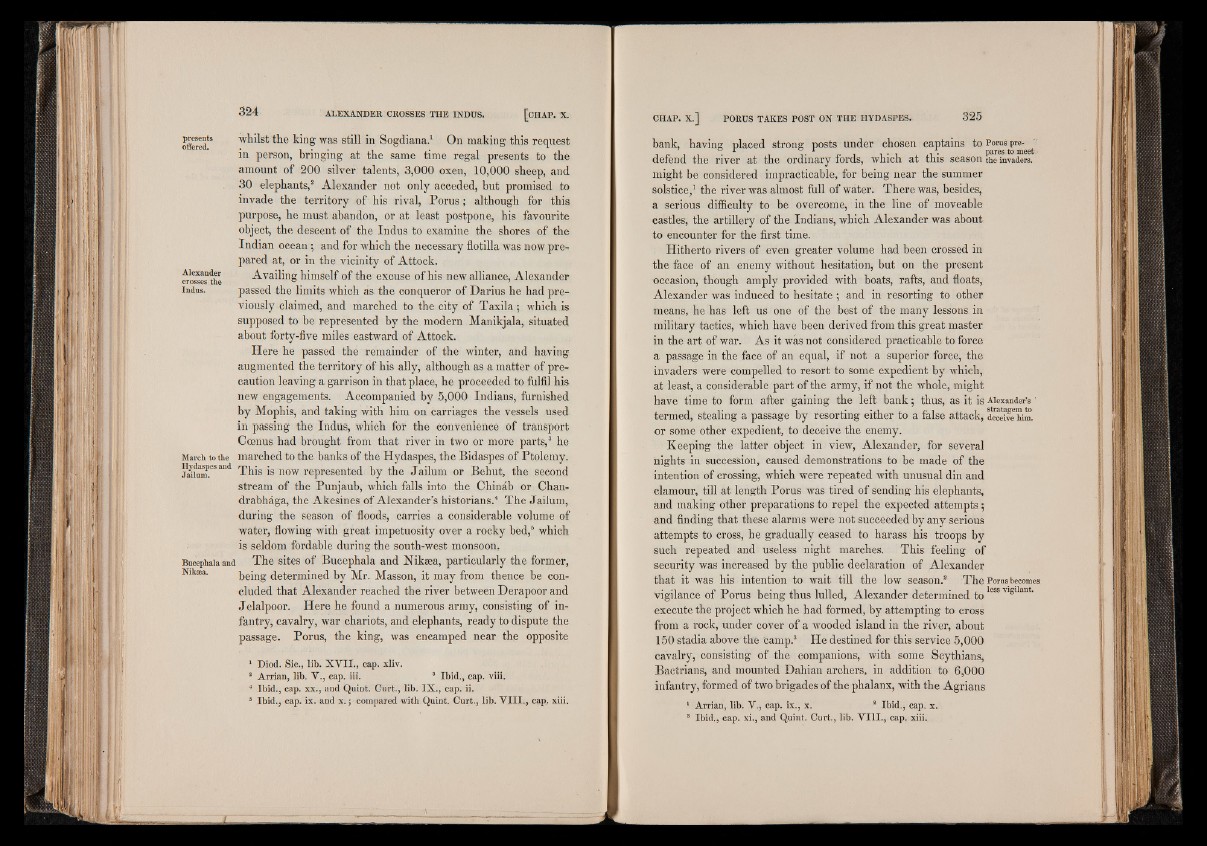
whilst the king was still in Sogdiana.1 On making this request
in person, bringing at the same time regal presents to the
amount of 200 silver talents, 3,000 oxen, 10,000 sheep, and
30 elephants,2 Alexander not only acceded, but promised to
invade the territory of his rival, Porus; although for this
purpose, he must abandon, or at least postpone, his favourite
object, the descent of the Indus to examine the shores of the
Indian ocean; and for which the necessary flotilla was now prepared
at, or in the vicinity of Attock.
Availing himself of the excuse of his new alliance, Alexander
passed the limits which as the conqueror of Darius he had previously
claimed, and marched to the city of Taxila; which is
supposed to be represented by the modern Manikjala, situated
about forty-five miles eastward of Attock.
Here he passed the remainder of the winter, and having
augmented the territory of his ally, although as a matter of precaution
leaving a garrison in that place, he proceeded to fulfil his
new engagements. Accompanied by 5,000 Indians, furnished
by Mophis, and taking with him on carriages the vessels used
in passing the Indus, which for the convenience of transport
Ccenus had brought from that river in two or more parts,3 he
March to the marched to the banks of the Hydaspes, the Bidaspes of Ptolemy.
M - # “ This is now represented by the Jailum or Behut, the second
stream of the Punjaub, which falls into the Chinab or Chan-
drabhaga, the Akesines of Alexander’s historians.4 The Jailum,
during the season of floods, carries a considerable volume of
water, flowing with great impetuosity over a rocky bed,3 which
is seldom fordable during the south-west monsoon.
Bucephaia and The sites of Bucephala and Niksea, particularly the former,
Niksea. being determined by Mr. Masson, it may from thence be concluded
that Alexander reached the river between Derapoor and
Jelalpoor. Here he found a numerous army, consisting of infantry,
cavalry, war chariots, and elephants, ready to dispute the
passage. Porus, the king, was encamped near the opposite
1 Diod. Sic., lib. X V I I ., cap. xliv.
2 Arrian, lib. V., cap. iii. 3 Ibid., cap. viii.
4 Ibid., cap. xx., and Quint. Curt., lib. IX ., cap. ii.
5 Ibid., cap. ix. and x .; compared with Quint. Curt., lib. V I I I ., cap. xiii.
presents
offered.
Alexander
crosses the
Indus.
bank, having placed strong posts under chosen captains to Poms pre-
_ „ . . i* i # pares to ineetD defend the river at the ordinary fords, which at this season the invaders,
might be considered impracticable, for being near the summer
solstice,1 the river was almost full of water. There was, besides,
a serious difficulty to be overcome, in the line of moveable
castles, the artillery of the Indians, which Alexander was about
to encounter for the first time.
Hitherto rivers of even greater volume had been crossed in
the face of an enemy without hesitation, but on the present
occasion, though amply provided with boats, rafts, and floats,
Alexander was induced to hesitate; and in resorting to other
means, he has left us one of the best of the many lessons in
military tactics, which have been derived from this great master
in the art of war. As it was not considered practicable to force
a passage in the face of an equal, if not a superior force, the
invaders were compelled to resort to some expedient by which,
at least, a considerable part of the army, if not the whole, might
have time to form after gaining the left bank; thus, as it is Alexander’s '
termed, stealing a passage by resorting either to a false attack, deceive Mm.
or some other expedient, to deceive the enemy.
Keeping the latter object in view, Alexander, for several
nights in succession, caused demonstrations to be made of the
intention of crossing, which were repeated with unusual din and
clamour, till at length Porus was tired of sending his elephants,
and making other preparations to repel the expected attempts;
and finding that these alarms were not succeeded by any serious
attempts to cross, he gradually ceased to harass his troops by
such repeated and useless night marches. This feeling of
security was increased by the public declaration of Alexander
that it was his intention to wait till the low season.2 The Porus becomes
vigilance of Porus being thus lulled, Alexander determined to less Tlgllant-
execute the project which he had formed, by attempting to cross
from a rock, under cover of a wooded island in the river, about
150 stadia above the camp.3 He destined for this service 5,000
cavalry, consisting of the companions, with some Scythians,
Bactrians, and mounted Dahian archers, in addition to 6,000
infantry, formed of two brigades of the phalanx, with the Agrians
1 Arrian, lib. V., cap. ix., x. 8 Ibid., cap. x.
8 Ibid., cap. xi., and Quint. Curt., lib. V I I I ., cap. xiii.